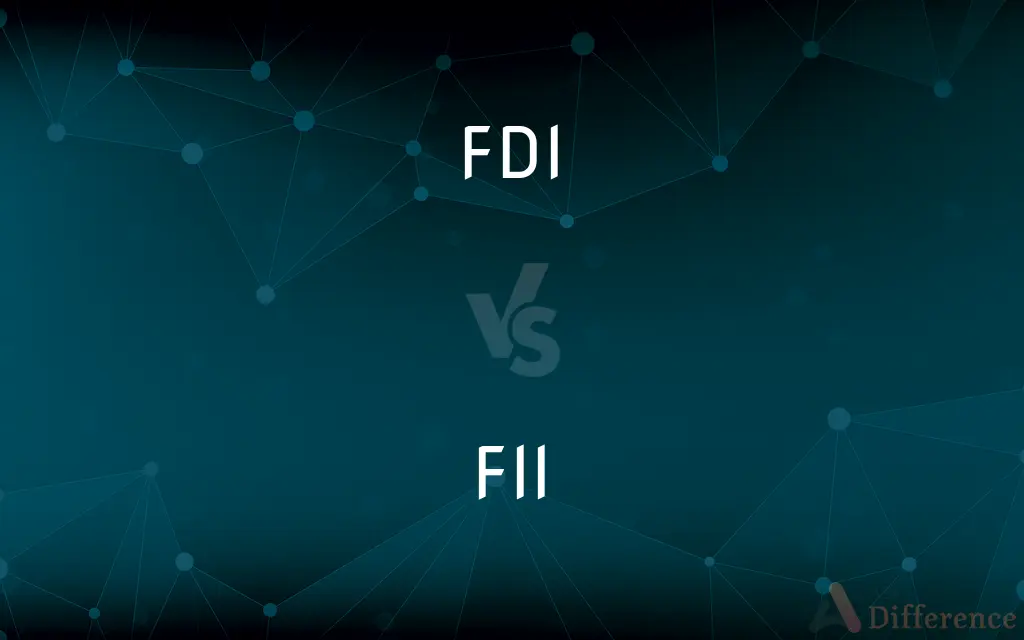FDI vs. FII — What's the Difference?
By Tayyaba Rehman — Published on December 11, 2023
FDI (Foreign Direct Investment) involves a long-term stake in a foreign entity, while FII (Foreign Institutional Investment) pertains to short-term investments in foreign financial assets.

Difference Between FDI and FII
Table of Contents
ADVERTISEMENT
Key Differences
FDI, or Foreign Direct Investment, and FII, or Foreign Institutional Investment, are both ways through which countries receive foreign capital. However, their nature, purpose, and impact differ significantly.
FDI refers to an investment made by an individual or entity based in one country into a business or corporation based in another country. It typically manifests as an overseas company buying a stake in, or establishing a new venture in, another country. On the other hand, FII refers to investors or investment funds investing in a country's financial markets, often buying stocks or bonds.
While FDI reflects a lasting interest and long-term investment in a foreign enterprise, usually influencing the management and operations of the invested company, FII is seen as a more temporary allocation of funds into a country's financial assets without influencing company decisions directly.
A primary advantage of FDI is that it can spur economic development, generate employment, and transfer technology or expertise to the host country. FII, conversely, offers liquidity to global markets but can be more volatile, sometimes leading to rapid outflows during economic uncertainty.
To sum up, while both FDI and FII bring foreign capital into a country, FDI focuses on long-term business interests, and FII is about short-term financial gains.
ADVERTISEMENT
Comparison Chart
Nature
Long-term investment in foreign businesses
Short-term investment in financial assets
Influence on Invested Entity
Direct, can influence management and operations
Indirect, doesn't typically influence operations
Duration
Long-term commitment
Typically short-term and more liquid
Impact
Spur economic development, job creation
Provide liquidity, but can cause market volatility
Type of Assets
Tangible assets like businesses, factories
Intangible assets like stocks, bonds
Compare with Definitions
FDI
Can manifest as mergers, acquisitions, or establishing new operations abroad.
Through FDI, the corporation expanded its global footprint by acquiring a European brand.
FII
Often driven by short-term financial gains rather than long-term business interests.
The sudden dip in FII was a reaction to short-term economic uncertainties.
FDI
A direct investment into production or business in a country by an entity from another country.
The American company made an FDI by opening a new factory in Mexico.
FII
Refers to the inflow of funds into stocks, bonds, or other financial assets.
Post-reforms, the nation saw a boost in FII, particularly in the bond market.
FDI
A lasting interest in a foreign entity or operation.
With its FDI, the firm hoped to influence the strategic direction of the foreign company.
FII
Provides liquidity to financial markets but can be volatile.
The market's volatility was a result of unpredictable FII flows.
FDI
A commitment to a foreign business that typically surpasses just financial allocation.
Their FDI in the overseas plant was not just monetary but also involved sharing expertise.
FII
Investments made by institutions like pension funds, mutual funds, and insurance companies.
Major pension funds contributed to the rise in FII for that quarter.
FDI
Often leads to technology transfer and employment generation in the host country.
The region benefited from FDI, seeing a rise in job opportunities.
FII
An investment in a country's financial markets by foreign institutions.
The surge in stock prices was attributed to increased FII.
Common Curiosities
What do FDI and FII stand for?
FDI stands for Foreign Direct Investment, and FII stands for Foreign Institutional Investment.
How is FDI different from FII?
FDI is a long-term investment in a foreign business, while FII involves short-term investments in foreign financial assets.
Does FDI influence the operations of a foreign company?
Yes, FDI typically allows the investor to influence the management and operations of the invested company.
Which is more volatile, FDI or FII?
FII is generally considered more volatile as it is often driven by short-term financial gains.
Does FDI always involve acquiring a company?
No, FDI can manifest as mergers, acquisitions, establishing new operations, or even just buying a stake without full acquisition.
Is technology transfer a common outcome of FDI?
Yes, FDI often leads to technology transfer and sharing of expertise between countries.
What assets do FII typically invest in?
FII typically invests in intangible assets like stocks, bonds, or other financial instruments.
What entities typically make FII investments?
Institutions like pension funds, mutual funds, and insurance companies are typical entities for FII investments.
Can economic policies influence FII?
Yes, economic policies, as well as economic stability, can influence the inflow or outflow of FII.
Can FDI be seen as a sign of confidence in a country's economy?
Often, yes. FDI usually indicates a long-term interest and confidence in the growth prospects of the host country's economy.
Why might a country encourage FDI?
Countries might encourage FDI to benefit from technology transfers, expertise, economic development, and employment opportunities.
Which is more long-term: FDI or FII?
FDI is more long-term focused, whereas FII is generally short-term.
Can FDI lead to job creation in the host country?
Yes, FDI can spur economic development and result in job creation in the host country.
Which type of foreign investment directly influences stock markets?
FII, as it involves investments in stocks and bonds, directly influences the stock markets.
Can FII lead to market volatility?
Yes, since FII is often short-term and more liquid, rapid inflows or outflows can lead to market volatility.
Share Your Discovery

Previous Comparison
Commercial Banks vs. Cooperative Banks
Next Comparison
Plant Vacuoles vs. Animal VacuolesAuthor Spotlight
Written by
Tayyaba RehmanTayyaba Rehman is a distinguished writer, currently serving as a primary contributor to askdifference.com. As a researcher in semantics and etymology, Tayyaba's passion for the complexity of languages and their distinctions has found a perfect home on the platform. Tayyaba delves into the intricacies of language, distinguishing between commonly confused words and phrases, thereby providing clarity for readers worldwide.
















































